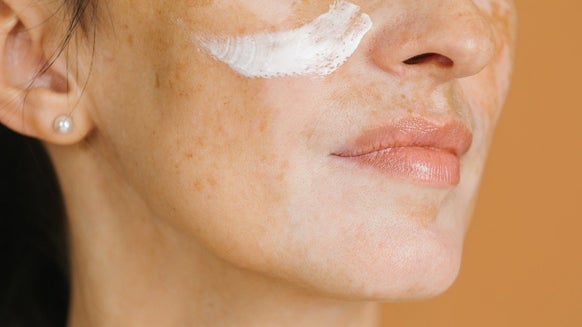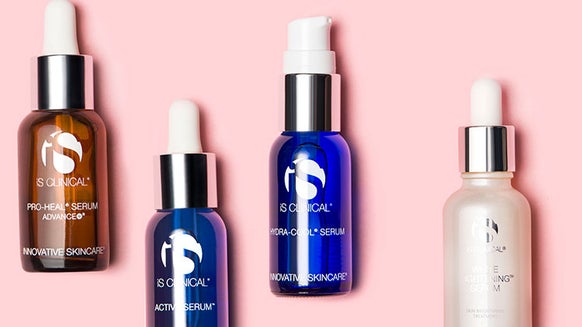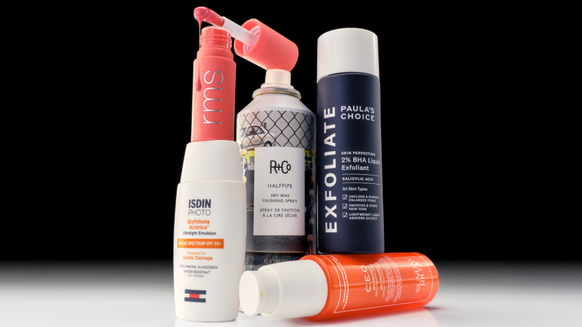Vitamin C: Myth or Truth

We like to think of vitamin C as the type-A ingredient of the skin care world. And true to form, it’s a veritable overachiever when it comes to its topical benefits: it helps fade dark spots and hyperpigmentation, helps skin appear brighter and overall more radiant looking, helps firm and promote the production of collagen and elastin, and prevents free radical damage. It can even help make your sunscreen more effective—and anything that helps our beloved EltaMD UV Daily Broad-Spectrum SPF 40 work even better is icing on top of its protective cake. So, it’s easy to see why it’s both one of the most recommended ingredients and one of the most misunderstood. We sat down with dermatologist, Dr. Ashley Magovern, to dispel some of the most common vitamin C myths.
Myth or Truth: You need to use vitamin C everyday.
Dr. Magovern: While, yes, you can absolutely use a vitamin C every day. I use mine every day because I really like the way it feels and layers under my products and gives my skin a glow. However, you don’t need to use a vitamin C product every day in order to get its full benefits. The receptors get saturated, so you probably only need to use a vitamin C product every other day.
https://www.instagram.com/p/Crd-kEoMufj/?taken-by=dermstore
We recommend:Eminence Organic Skin Care Citrus Kale Potent CE Serum
Myth or Truth: You need to wait to apply other products after applying your vitamin C serum.
Dr. Magovern: No, you don’t need to. Who has time for that? Layering products actually helps the penetration of the one underneath. I usually just wait a second until it dries slightly; it tends to layer better that way.
We recommend:Obagi Medical Professional-C Serum 20%
Myth or Truth: You can’t use vitamin C if you have active breakouts.
Dr. Magovern: Contrary to what some people say, I think you can use vitamin C on active breakouts. A potent antioxidant and anti-inflammatory, it can help treat the inflammation associated with acne. Some vitamin C products are combined with a beta-hydroxy acid and are a good choice for those that are acne-prone. However, some patients do find that they break out with some vitamin C products, so you’ll have to find one that has a vehicle and other ingredients that agrees with your skin.
We recommend:SkinCeuticals Silymarin CF
Myth or Truth: You can’t use vitamin C with other active ingredients.
Dr. Magovern: This is a big myth that’s not exclusive to vitamin C; that combining products with different pHs can inactivate each other. We see this commonly with articles written about glycolic acid, which has a lower pH than some of the other common ingredients in skin care, such as niacinamide and vitamin C. For example, there is a concern that niacinamide increase the pH of glycolic acid, making it less effective. This may be true when formulating a product with a combination of these two ingredients, but using them together (like when you're layering two different products in your routine) will not be detrimental to the skin.
In fact, they complement each other. You can also mix niacinamide with vitamin C (even if it’s the L-ascorbic acid form). There is some concern with oxidation, color change, degradation, but the combination is more of a concern with formulators than with the user. Using two different products, like using niacinamide in the morning and vitamin C at night is also completely fine, and probably beneficial. I often recommend both of these products, especially to someone who has pigmentation concerns. Both of these products can cause some redness on their own, but your skin should adjust. If the product isn’t working for you, you may want to just try a different brand or formulation.
We recommend:Paula's Choice C15 Super Booster
Myth or Truth: Vitamin C stains your skin.
Dr. Magovern: Products that contain the L-ascorbic acid form of vitamin C can oxidize easily and could cause some temporary discoloration/tint to the skin. If you find that this is a problem for you, you can use a product that contains an ester form of vitamin C, which won’t oxidize in the air. Layering a moisturizer over your vitamin C could help prevent this issue.
We recommend:Sunday Riley C.E.O. 15% Vitamin C Brightening Serum
Myth or Truth: Vitamin C should only be used in the morning.
Dr. Magovern: I know everyone hears this debate, but I don’t think it really matters. Some experts think that it’s best to use vitamin C at night to help repair and regenerate your skin along with the healing powers of sleep, but I think that you can get much of the antioxidant and collagen-stimulating benefits any time you use it. I like the way mine feels in the morning.
We recommend:iS Clinical Pro-Heal Serum Advance+

Teresa Greenfeld has worked in fashion and beauty for over 15 years as a writer, editor and content strategist. She has been privileged to work at Carbon38 as a Senior Editor, at OliviaPalermo.com as the Fashion and Beauty Director, and has amassed a resume that includes Vogue, Allure and Elle magazines. Her passions include back-to-back sheet masks, reading peer-reviewed papers on skin care, and obsessive sunscreen application. Though born in Manhattan, she currently lives in LA, and will always consider herself a New Yorker at heart.







